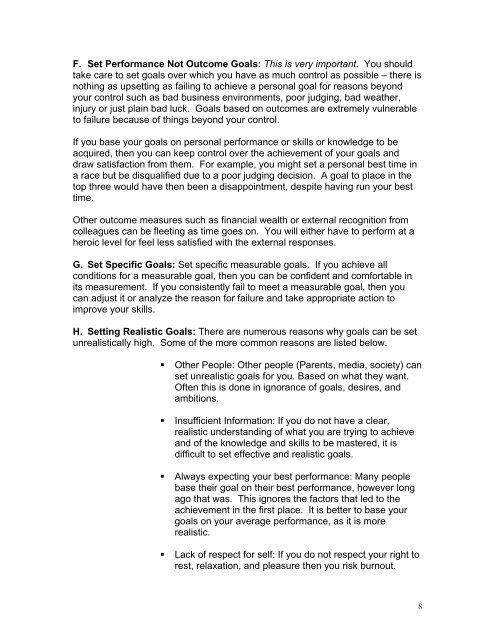Goal Setting, Planning and Decision Making
Goal Setting, Planning and Decision Making
Goal Setting, Planning and Decision Making
You also want an ePaper? Increase the reach of your titles
YUMPU automatically turns print PDFs into web optimized ePapers that Google loves.
F. Set Performance Not Outcome <strong>Goal</strong>s: This is very important. You should<br />
take care to set goals over which you have as much control as possible – there is<br />
nothing as upsetting as failing to achieve a personal goal for reasons beyond<br />
your control such as bad business environments, poor judging, bad weather,<br />
injury or just plain bad luck. <strong>Goal</strong>s based on outcomes are extremely vulnerable<br />
to failure because of things beyond your control.<br />
If you base your goals on personal performance or skills or knowledge to be<br />
acquired, then you can keep control over the achievement of your goals <strong>and</strong><br />
draw satisfaction from them. For example, you might set a personal best time in<br />
a race but be disqualified due to a poor judging decision. A goal to place in the<br />
top three would have then been a disappointment, despite having run your best<br />
time.<br />
Other outcome measures such as financial wealth or external recognition from<br />
colleagues can be fleeting as time goes on. You will either have to perform at a<br />
heroic level for feel less satisfied with the external responses.<br />
G. Set Specific <strong>Goal</strong>s: Set specific measurable goals. If you achieve all<br />
conditions for a measurable goal, then you can be confident <strong>and</strong> comfortable in<br />
its measurement. If you consistently fail to meet a measurable goal, then you<br />
can adjust it or analyze the reason for failure <strong>and</strong> take appropriate action to<br />
improve your skills.<br />
H. <strong>Setting</strong> Realistic <strong>Goal</strong>s: There are numerous reasons why goals can be set<br />
unrealistically high. Some of the more common reasons are listed below.<br />
• Other People: Other people (Parents, media, society) can<br />
set unrealistic goals for you. Based on what they want.<br />
Often this is done in ignorance of goals, desires, <strong>and</strong><br />
ambitions.<br />
• Insufficient Information: If you do not have a clear,<br />
realistic underst<strong>and</strong>ing of what you are trying to achieve<br />
<strong>and</strong> of the knowledge <strong>and</strong> skills to be mastered, it is<br />
difficult to set effective <strong>and</strong> realistic goals.<br />
• Always expecting your best performance: Many people<br />
base their goal on their best performance, however long<br />
ago that was. This ignores the factors that led to the<br />
achievement in the first place. It is better to base your<br />
goals on your average performance, as it is more<br />
realistic.<br />
• Lack of respect for self: If you do not respect your right to<br />
rest, relaxation, <strong>and</strong> pleasure then you risk burnout.<br />
8
















